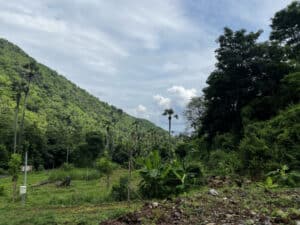Foreign investment in Bali
Are you looking to invest in a Bali property but unsure where to start? Foreign investment in Amed is ramping up as investors begin to recognise that the charming fishing town has entered the early stages of a property market cycle.
Bali, renowned for its captivating landscapes and thriving tourism industry, has become a hotspot for international property investors.
One area that is attracting foreign investment is Amed. The emerging tourist town is known for promising returns on investment.
Explore the allure of Bali as a foreign property investment hub, with a focus on the growing trend of foreign property investment in Amed.
Learn about foreign investment in Amed
By reading this article, you will learn that;
- Bali is a prime destination for foreign property investment due to its scenery, culture, and tourism.
- Amed stands out for its high ROI potential and growing property values.
- The article covers legal regulations, property options, investment approaches, financing, taxation considerations, due diligence, and success stories in Bali real estate.
Bali as a property investment hub
Bali, with its unparalleled natural beauty and vibrant culture, has captured the attention of foreign investors looking to capitalise on the island’s real estate market.
The peaceful coastal town of Amed, in particular, offers high property value appreciation and lucrative rental income opportunities, making it an attractive option for investors.
Learn more about the Vesica Villas Celuke Development in Amed and how it embodies the potential for a rewarding investment venture.

Scenery, culture, and tourism
Bali’s charm lies in its stunning landscapes, rich culture, and bustling tourism industry. The island’s picturesque scenery, including lush rice terraces and pristine beaches, attracts visitors worldwide.
This unique blend of natural wonders and cultural experiences has positioned Bali as a sought-after destination for property investors seeking both personal enjoyment and financial gain.
Real estate opportunities in Amed
Amed, among Bali’s regions, stands out for its potential for high property value appreciation and lucrative rental income opportunities.
The tranquil ambiance of Amed offers a serene escape, attracting investors and visitors seeking a peaceful setting.
The Vesica Villas Celuke Development in Amed represents a promising investment opportunity in a rapidly developing area.
Property ownership laws in Bali
Foreign investors in Bali must navigate the legal framework governing property ownership. While Indonesia imposes restrictions on foreign land ownership, avenues such as leasehold arrangements and establishing a foreign-owned company (PT PMA) provide opportunities for property acquisition.
Limitations for foreign investors
Foreign investors in Bali must adhere to specific regulations set by Indonesian authorities to ensure sustainable development and protect local interests. Understanding the foreign property ownership laws in Indonesia are crucial for operating legally and securely in Bali’s real estate market.
Real estate investment in Amed
Foreign investors in Bali can choose from a variety of property types, including luxurious villas, modern apartments, and commercial spaces. Each property type offers unique investment opportunities tailored to different investor preferences and objectives.
Amed, with its promising growth prospects and peaceful ambiance, has attracted foreign investors seeking high returns.
The Vesica Villas Celuke development in Amed presents a compelling investment opportunity, blending modern amenities with a serene coastal setting.

Property investment strategies
Foreign investors can adopt various investment strategies in Bali, such as buy-to-let arrangements, capital growth focus, and participation in development projects. Each approach offers distinct considerations and rewards aligned with investors’ goals.
Maximizing ROIs in Amed
To maximize ROI in Amed, foreign investors can leverage strategies like property management services, targeted marketing efforts, and continuous property enhancements. Active management and market awareness can optimize returns in Amed’s competitive real estate landscape.
Property financing solutions
Foreign investors in Bali can explore financing options like bank loans, developer financing, and peer-to-peer lending platforms to support their property acquisitions. These solutions offer flexibility and access to capital for investment endeavors.
Securing a mortgage in Amed
Securing mortgage to purchase a property in Amed involves meeting specific procedures and requirements set by financial institutions. Foreign investors must diligently navigate the mortgage application process and comply with legal requirements for property investments in Amed.
Taxes to pay on property investments
Foreign property holders in Bali are subject to various tax obligations, including property taxes and capital gains taxes. Understanding the tax implications of property ownership is essential for managing financial responsibilities and optimising investment returns.
Property investors in Amed must familiarise themselves with local tax regulations, rates, and filing procedures. Staying informed about the tax landscape in Amed enables investors to make informed decisions and manage tax liabilities effectively.
| Topic | Details |
|---|---|
| Tax Obligations for Foreign Investors | Foreign property holders in Bali are subject to property taxes and capital gains taxes, impacting investment returns. |
| Property Taxes in Amed | Detailed understanding of local tax regulations, rates, and filing procedures is essential for effective tax management in Amed. |
Due diligence in Bali
Thorough due diligence is essential for foreign investors in Bali to mitigate risks and make informed investment decisions aligned with their objectives. Verifying property titles and assessing market risks are critical aspects of due diligence in real estate investment.
Property investment risk
While Bali offers lucrative investment opportunities, foreign investors must proactively manage risks like regulatory changes and market volatility. Implementing risk management strategies is crucial to safeguard investments and ensure long-term profitability, particularly in areas like Amed.
Using a property agent
Collaborating with experienced agents and developers in Bali’s real estate market can provide valuable insights and streamline investment processes. Partnering with professionals with local expertise enhances investors’ chances of success and access to exclusive opportunities.
In Bali’s competitive real estate landscape, local expertise is invaluable for foreign investors to make informed decisions and capitalize on market trends. Local professionals offer insights into market dynamics, regulatory nuances, and investment opportunities specific to Amed.

Discovering Amed’ s hidden gem
Tourists visiting Amed are increasingly captured by its stunning charm. As the town continues develop at such a rapid pace, investors are viewing the emerging real estate markets as a way to diversify their portfolios.
Vesica Property Developments is focussed purely on Amed’s real estate market. Our expertise in Amed is second to none. Our understanding of Amed’s property market is delivered in this investors report with a high conviction.
Rental villas for sale in Amed
With a high ROI potential, Vesica Villas Celuke presents property investors with a chance to capture a piece of prime real estate during the very early stages of a property boom cycle.
Just minutes away from Amed beach and the town center, the prime location in Amed offers ocean views surrounded by stunning scenery.
The rental potential from such property will be the perfect solution for the increasing tourist footfall. Combining the growing demand for holiday villa rentals with the increase in tourist numbers, the 3-bed/3-bath luxury pool villas will be in high demand for those looking for a luxurious stay in this charming fishing town.
Bali's real estate market outlook
A comprehensive analysis of current market trends in Bali and Amed provides insights into the real estate landscape and investment opportunities.
Understanding market trends allows investors to make informed decisions and position themselves strategically in Bali’s evolving real estate market.
The future of foreign investment in Amed shows promise, with continued growth potential and evolving market dynamics. Amed, in particular, presents opportunities for further development and investment, attracting investors seeking long-term wealth creation through real estate investments.
Conclusion
In conclusion, Bali offers lucrative opportunities for foreign investors looking to diversify their portfolios through real estate investment. With Amed emerging as a prime location for property investment, investors can unlock significant ROI potential and long-term value appreciation.
Understanding the legal framework, strategic approaches, financing options, and risk management strategies is crucial for navigating Bali’s real estate market successfully. Exploring investment opportunities in Amed can lead to rewarding returns and a fulfilling investment journey in Bali’s thriving real estate market.
FAQs
- Researching and selecting a property.
- Negotiating terms and price.
- Conducting due diligence to check property legality and encumbrances.
- Signing a sales and purchase agreement (Akta Jual Beli) or lease agreement.
- Transferring payment.
- Updating the property title under the new ownership or leaseholder’s name.
The process and timeframe for buying land in Bali can vary depending on a number of factors, such as the location, the type of land, the ownership structure, and the specific regulations and requirements involved. Once you have found the land you want the land transfer process takes about a month.
- Inspection and due diligence (2 weeks)Contracts (1 week)Money transfer (1 week) Timeframes can vary for many reasons, but the above timeline is a fair representation.
The costs of buying a villa and leasing land in Bali can vary depending on factors such as the location, size, and condition of the property, as well as the terms of the lease and the fees charged by agents and lawyers. Generally speaking, you can expect to pay the following costs:
- Purchase price of the villa: Initial capital outlay for your villa.Leasehold fees: This includes the cost of the lease, which can vary depending on the location and size of the land, as well as any renewal fees and taxes. A typical leasehold fee is around 10-15% of the purchase price per year.Legal fees: You will likely need to hire a lawyer to assist with due diligence, drafting contracts, and registering the property, which can cost around 1-2% of the purchase price.
- The first step in setting up a PT.PMA business is to determine your business activities and the type of company structure you require. This will involve choosing a business name and identifying the shareholders, directors, and commissioners of the company.
- Obtain a Tax Identification Number (NPWP). To obtain a Tax Identification Number (NPWP) for your company, you will need to register with the tax authorities in Indonesia. This will involve submitting a range of documents, including your business plan, company registration documents, and other supporting materials.
- Secure your Business License and Company Registration.
- Once you have your NPWP, you will need to secure a business license and register your company with the relevant authorities in Bali. This will involve submitting a range of documents, including your articles of association, shareholder agreements, and other supporting materials.
- Setup a business bank account in Indonesia and deposit the minimum paid-up capital.
- Obtain other necessary permits and licenses.
Depending on the nature of your business activities, you may need to obtain other permits and licenses from various government agencies in Bali. These may include licenses related to construction, environmental impact, or other regulatory requirements.
The approximate costs of setting up a PT.PMA business in Bali can vary widely depending on a range of factors such as the nature of your business activities, the size of your company, and the complexity of the regulatory requirements. A simple company setup is approximately $2,500 and takes around two weeks to complete incorporation.
The terms of leasing land in Bali are agreed between the land owner and the individual or party interested in leasing the property. A typical lease will last from 25-30 years, however, some leases are as short as 20 years, while others can be longer than 40 years. The figures refer to the initial lease.
The lease contract will normally permit the leaseholder to extend the lease for a similar period to the initial lease, however, the price will reflect the updated market value of the land at the time of the renewal.
Foreigners are allowed to own villas and land in Bali through a leasehold or a Right-to-Use (Hak Pakai) agreement, as owning land in Indonesia is restricted to Indonesian citizens and Indonesian legal entities.
A leasehold agreement grants the foreigner the right to use the land and villa for a certain period of time, typically up to 25 years, with an option to renew the leasehold agreement. A Right-to-Use agreement grants the foreigner the right to use the land and villa for up to 80 years, which is a longer term than a leasehold agreement.
- PT.PMA – Foreign-owned investment companyNPWP – Tax Identification NumberIMB -IMB (Izin Mendirikan Bangunan) is a building permit.Pondok Wisata – License to rent your villa out to tourists.Notaris – An official responsible for drafting and authenticating lease & legal agreementsBPHTB – Land and Building Acquisition TaxHak Malik – FreeholdGreen zone – Cannot build onYellow zone – legal to build on.Hak Pakai – LeaseholdAre – Unit of measure predominantly used in Indonesia. 1 are = 100sqm’sIDR – Currency used in Bali. 15,250 IDR = $1
When buying a villa and leasing land in Bali, there are several taxes and fees that you may need to pay, including:
- Value-Added Tax (VAT): This is a tax imposed on the sale of new properties and is typically around 10% of the purchase price. However, if the seller is not a taxpayer or does not have a VAT ID number, the tax rate is increased to 20%.Land and Building Acquisition Tax (BPHTB): This is a tax on the transfer of ownership of land and buildings and is typically calculated based on the sales price or the assessed value of the property, whichever is higher. The tax rate varies depending on the location and value of the property but can range from 1% to 5%.Notary and Land Deed Fees: You will need to pay fees to the notary for drafting and registering the land deed, which is typically around 1% of the sales price.Legal Fees: You will need to hire a lawyer to assist with due diligence, drafting contracts, and register the property, which can cost around 1-2% of the purchase price.Rental Income Tax: If you plan to rent out the villa, you will need to pay income tax on the rental income. The tax rate varies depending on your residency status and can range from 5% to 30%. It is important to note that taxes and fees can change over time, and the above information is accurate as of 2023. We recommend consulting with a qualified tax advisor or lawyer to get up-to-date information on tax implications when buying a villa and leasing land. Please Contact Us for more information on this subject
The return of investment is around 7 years. This is a conservative estimate based on the current real estate market in Amed. However as land and property prices are on the increase, buying a villa in Amed before prices explode gives you the best chance to generate outsized returns on your investment.
Our property management services cover everything from maintenance to rental bookings. We offer a complete villa management solution along with monthly reporting and tax accounting assistance.
For a luxury, 3-bed pool villa, investors can buy a home in Amed for around USD$249,000. The cost of buying a villa in Amed is considerably cheaper than a like-for-like property in Seminyak, Sanur or Canggu.
The real estate market in Amed is entering the early stages of a property boom. Land and property prices are currently low compared to the more established areas in the Southern part of Bali. Property investors are looking to profit from low prices in Amed as they anticipate significant land and property value appreciation.








